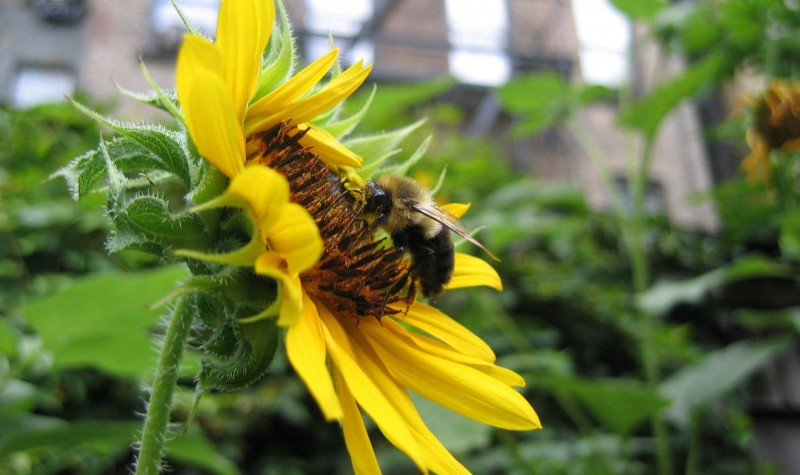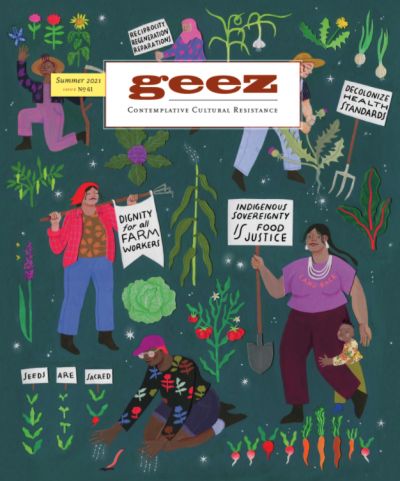Sunflowers and Manna

Image Credit: A bumblebee feasts in East Village, Detroit, Michigan, August 2004, schizoform CC.
Where is your table? Who is sitting around it? What are you hungering for?
The audio is a transcript of the written piece recorded by Lydia Wylie-Kellermann and Kateri Boucher for Geez Out Loud.
As I begin to imagine words on this page, my eyes wander around this well trodden landscape. To my right, native strawberry plants poke through the soil under the hammock. On my left, the small sunflower sprout my four-year-old nephew, Ira, has been tending, is now a dozen centimetres tall. While the snow still fell, he planted the seed and checked it each day while it grew beside the window. Finally, he found its home here between the stacks of logs waiting to be next year’s warmth in the wood stove.
Kateri and I collaborate to determine the editorial vision of each issue of Geez, which is then brought to life through beauty by Lucia. So for Geez 61: Seeds Are Sacred, we decided to write the editorial together. And what better place to dream these words than outside in the garden, where we sit upon the wooden picnic table while maple flowers fall upon our keyboards. Still two metres apart, yet screen to screen, eyes to eyes, dream to dream.
Kateri: I came here this morning after a shift at Manna Community Meal soup kitchen, serving bagged lunches to folks from a table outside the church building. I am thinking of each of them still as we sit down to write, holding their names and faces in my mind and hoping these pages, somehow, can honour their lives. Can honour both their hungers and their joys.
These past two years of my life, living in Detroit’s Catholic Worker house and working at the neighbouring soup kitchen, have brought me into more regular contact with hunger. And they have also brought me more regularly into experiences of the richness, abundance, and messiness of sharing food together. Extra emphasis on the messiness part.
As this issue reminds us, each step in making and eating food is rife with complexity. The ways we eat, those we gather with, the land our food comes from, the hands who prepared it . . . even the lines around what counts as “food” seem to become blurrier the closer we look (or perhaps the closer we smell). The concept of “food justice” is as messy as our own tables – and all of our tables are abundantly unique.
As we open this issue, we ask: Where is your table? Who is sitting around it? What are you hungering for?
Lydia: My table has long been planted in Waawiyatanong (where the waters go round), named and still loved by the Anishinaabe peoples, now known as Detroit, Michigan. I have become a disciple to this watershed, learning from the land and movements that dwell in this place.
One of those great teachers has been the urban agricultural movement – a movement led by Black farmers resisting food insecurity and capitalism by growing food to support communities.
The city has changed so much in the past decade; what once felt like a city abandoned by corporations is now swarming with the surveilling eyes of gentrification. Land once left to communities for goats and raspberries is now being mowed down for apartment buildings.
Yet gardens persist. Communities persist. And the work has become part of the daily rhythms of my life – pruning grape vines, planting seeds, freezing and canning, and sharing the abundance with neighbours.
Kateri: Our Geez editorial team is physically rooted here in Detroit and spiritually rooted in the Biblical tradition. Stories of food and justice are woven through so many of those ancient texts, and we continue to turn towards them as we wrestle with these questions today. In Exodus, we listen to the words of these ancestors who have also known great hunger and great joy:
The people of Israel called the food manna (“What is it?”). It was like a small white seed, and tasted like thin cakes made with honey. Moses said, “God has commanded us to save some manna, to be kept for our descendants, so that they can see the food which God gave us to eat in the desert when God brought us out of Egypt.
I love that “manna” translates as a question. What is this stuff that has been given to us? And what are we to do with it?
Although I’m far from the reality of surviving on only manna each day, I find its lessons resonating through my life and through these pages. Manna has to do with sabbath (collecting enough on the 6th day so you can rest on the 7th), community (making sure everyone gets their fill), justice (it rots if you take more than you need), and resistance (against Egypt, whose tools of empire allowed food to be stored much longer than manna’s quick expiration date allowed).
I give thanks for these stories, passed along from descendant to descendant, both feeding us and challenging us to connect more deeply with the communities around us and the soil beneath our feet.
Lydia: It is in resting my body in the branches of an apple tree or laying carrot seeds in the raised bed worn with time and history where I find my spiritual grounding. I feel sacrament when my fingers reach into the soil. My heart has been schooled in rhythms of death and life, of hunger and harvest. It is the smell of tomato leaves and the rough stems of the cucumber vines that have offered me sanctuary.
I quickly realized as we were working on this issue that I wanted it scattered with prayer. Prayers to take to our gardens. Blessings ready for the seeds and the worms and the water. I imagine them covered in mud with tomato seeds stuck in the margins. I want to return to these prayers seasonally, remembering the rest, the hope, the harvest. Finding church with the communion of earthworms, rotting compost, and hanging sweet peas.
Kateri: Dorothy Day said, “Peace begins when the hungry are fed.” And I wonder if justice begins sometime after that. When the hungry are not just fed but fed well. When those who grow and make the food are honoured and flourishing. When we are in relationship with the land and practising mutual reciprocity with all its inhabitants. When we begin to truly feed each other, not just with physical food but also with the spiritual nourishment and political solidarity we need to survive.
Lydia: Dearest readers, when you read this, the strawberries will be canned as jam, the maple leaves will be full and offering shade on hot, humid days, and in all hopes this beloved sunflower will be taller than me, offering beauty and survival for our neighbours the squirrels and cardinals. Time moves. Seasons change. We are fed in body and spirit. May our lives offer beauty and substance back to this glorious ecosystem where our bodies rise each day.
Lydia Wylie-Kellermann and Kateri Boucher are editors at Geez and live in Detroit, Michigan.



Start the Discussion